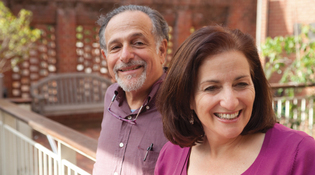 loading
loading
Light & VerityNew rabbi in charge at Slifka CenterPonet will retire after 34 years.  Mark OstowLongtime Howard M. Holtzmann Jewish Chaplain James Ponet ’68 and new senior Jewish chaplain Leah Cohen at the Slifka Center for Jewish Life, where Cohen is also the new executive director. View full imageWhen James Ponet ’68 returned to Yale as campus rabbi in 1981, he inherited a small office in the basement of Bingham Hall and no staff. The kosher kitchen, where observant Jews could take their meals, was in a basement on Crown Street, far from the central avenues of campus life. Ponet raised funds prodigiously, and in 1995 he presided over the opening of the Joseph Slifka Center for Jewish Life at Yale, the Wall Street building that has become a hub not only for Jews, but for everyone at Yale and in the surrounding community who is interested in Jewish culture. “We had to do something big,” Ponet says. Thirty-two years later, Ponet announced last fall that he will be retiring at the end of June 2015 and spend the rest of his term on an 18-month sabbatical. He acknowledges that it was his board of directors that first suggested the possibility of retirement—but says it was a “conjoint decision,” and that, in a good way, he brought it on himself. The community he built is now such a successful enterprise, requiring so much administration, that the self-confessed “form-averse” intellectual was no longer the right rabbi for the job. “You could say it’s a matter of temperament, or you could say it’s willfulness,” says Ponet, who adds that he always hated paperwork. Leah Cohen, who is now executive director of the Slifka Center and senior Jewish chaplain—the first time these jobs have been combined—started working alongside Ponet last fall. A Reform rabbi, Cohen led a congregation in suburban Connecticut for 13 years; she also has a master’s degree in international management and has worked in marketing for major corporations. Mike Uram, campus rabbi and director of the Hillel organization at the University of Pennsylvania, says that the changes at Yale are in line with those in the wider world of Jewish campus life: as Jewish life grew on secular campuses, an entrepreneurial mindset took hold. Beginning in the 1980s, “they wanted Hillels to become more high-functioning, more organizationally intelligent. So there was a whole phase when a lot of MBAs were recruited to be Hillel directors.” Lately, the trend has changed again. “They found they had all these people who had fund-raising or organizational skills, but no Jewish vision,” Uram says. So a Hillel director now needs organizational skills but also spiritual gravity. Cohen says this is nothing new for a former congregational rabbi. “At the point you become ordained, you are always a rabbi: 24/7, when I am at the gym, when talking to students, when talking to a donor,” Cohen says. “It’s an outlook on the world. I am always teaching about Judaism. But the management, budgeting, and strategic planning is part of every day. That is interwoven. And that suits me. That is how I am.”
The comment period has expired.
|
|